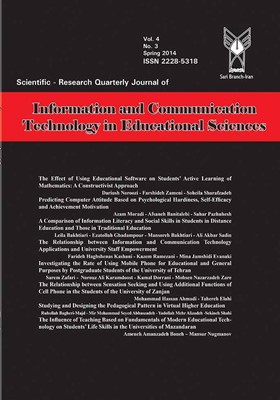The Relationship between Sensation Seeking and Using Additional Functions of Cell Phone in the Students of the University of Zanjan
Subject Areas :
Infomartion Technology
Mohammad Hassan Ahmadi
1
*
,
Tahereh Elahi
2
1 - M.A. Student of Psychology, University of Zanjan, Zanjan, Iran
2 - Assistant Professor of Psychology, University of Zanjan, Zanjan, Iran
Received: 2014-01-17
Accepted : 2013-11-01
Published : 2014-05-01
Keywords:
Mobile Phone,
students,
sensation seeking,
Dependency,
additional functions,
Abstract :
The purpose of the present study was to identify different levels of sensation seeking and to assess how these relate to using additional functions of cell phones. Research method was correlational. A sample of 400 students (228 female, 172 male) from the University of Zanjan was selected using random cluster sampling. The students were asked to complete sensation seeking questionnaire as well as questionnaires on using images and video clips of cell phones. Data was analyzed by using Pearson correlation coefficient and two independent group's t test. Statistical analyses revealed significant relationship between level of sensation seeking and using cell phone images and video clips. In addition, individuals with low levels of sensation seeking used political and religious images in their cell phone photo gallery significantly less than high sensation seekers. Low sensation seekers used video clips with nature, social, romantic, scientific, or political themes or those related to poets, authors, or sportspersons (related to women) significantly more than the individuals with high levels of sensation seeking. In contrast, high sensation seekers used shows and videos featuring naked or semi-naked persons significantly more than students with low levels of sensation seeking. Girls used images of political, religious, and literary figures more than boys and boys were more inclined than girls to use photos of political and sport figures.
References:
Aconomides, A. A., & Grousopoulou, A. (2008). Use of mobile phones by male and female. Computer & Education, 9, 235-246.
Agarwal, A., Deepinder, F., Sharma, K. S., Ranga, G., & Li, G. (2008). Effect of cell phone usage on semen analysis in men attending infertility clinic: An observational study. Journal of Feritility and Sterility, 89(1), 124-128.
Amiri, M. (2007). Study of sensation seeking and use of short message at girls student mobile phone. Masters Thesis, Islamic Azad University, Roudehen Branch. (in Persian).
Billieux, J., VanderLinden, M., Dacremont, M., Ceschi, G., & Zermatten, A. (2007). Does impulsivity relate to the perceived dependence on actual use of the mobile phone? Applied Cognitive Psychology, 21, 527-537.
Ferieser, M. (2009). Sector profile: Porn in the USA. Retrieved from www.mobile entertainment news
Fortunati, L. (2001). The mobile phone: An identity on the move. Personal and Ubiquitous Computing, 5(2), 85-98.
Franken, R. E. (1998). Human motivation (Fourth Edition). New York: Brooks/ Cole.
Goudarzi, M. A., & Shirazi, M. (2003). Study of the links between hyperactivity and behavior of dangerous driving. Journal of Psychology, 1, 34-50. (in Persian).
Griffiths, M. L. (2000). Does internet and computer ‘‘addiction” exist? Some case study evidence. Cyber Psychology & Behavior, 3(2), 211–218.
Hoseyni, H. (2003). Analisis of sociologic relation between internet and addiction to drug.Communication & Cultural Studies, 1(3), 1-17. (in Persian).
Huh, S., & Bowman, N. D. (2008). Perception and addiction of online games as a function of personality traits. Media Psychology, 13(2), 233-244.
Jenaro, C., Flores, N., Gmez-Vela, M., Gonzlez-Gil, F., & Caballo, C. (2007). Problematic Internet and cell-phone use: Psychological, behavioral, and health correlates. Addiction Research & Theory, 15(3), 309–320.
Kamibeppu, K., & Sugiura, H. (2005). Impact of the mobile phone on junior high school students’ friends hips in the Tokyo metropolitan area. Cyber Psychology & Behavior, 8(2), 121-130.
Karhoca, A. (2006). Individual differences in usability of cell phone SMS Menus. Proceedings of the 5th WSEAS International Conference on Telecommunications and Informatics, Istanbul, Turkey, 485-490.
Kimberly, S. Y., & Rodgers, R. C. (1998). Internet addiction: Personality traits associated with its development. Paper presented at the 69th annual meeting of the Eastern Psychological Association.
Kosari, M., Yegane, M. R., & Kheirkhah, T. (2009). The employ of cell phone for Iranian user. Cultural Studies, 7, 205-226. (in Persian).
Leung, L. (2007). Linking psychological attributes to addiction and improper use of the mobile phone among adolescents in Hong Kong. Journal of Children and Media, 6(2),120-132. Retrieved from www.sciencedirect.com/science. Linking Psychological Attributes to Mobile Phone Addiction.
Lorente, S. (2002). Youth and mobile telephones: More than a fashion. In Villar, E.A. (Eds.) Revista de studios de juventud (pp. 9-24). Youth and Mobile. Madrid: A.G. LUIS PEREZ.
Louis, L. (2008). Leisure boredom, sensation seeking, self-esteem, addiction symptoms and patterns of mobile phone use. In E. Korini, S.Utz, M. Tanis, & S. Barnes. (Eds.), Mediated Personal Communication (pp. 359-381). New York: Routledge.
Manteghi, M. (2007). Guidance of parents on childs use of new communication technology: Cell phone. Tehran: Abed. (in Persian).
Manteghi, M. (2012). Study of the use additional functions of mobile phones among of boy students. Psychological Researches, 7, 89-105. (in Persian)
McGuigan, J. (2005). Toward a sociology of the mobile phone. An Interdisciplinary Journal on Humans in ICT Environments, 1(1), 45-57.
Pease, A., & Pease, B. (2002). Why males liaring? And why females crying? (translated by Nahid, Rashid and Nasrin, Goldar). Tehran: Asim. (in Persian).
Pertierra, R. (2005). Mobile phones, identity and discursive intimacy. An Interdisciplinary Journal on Humans in ICT Environments, 1(1), 23-44.
Plant, S. (2000). On the mobile, the effects of mobile telephones on social and individual life. Online Publications Sociology of the Mobile Phone. SoziologischesInstitut der Universitat Zürich.
Rittippant, N., Witthayawarakul, J., Limpiti, P., & Lertdejdecha, N. (2009). Consumers’ perception of the effectiveness of short message service (SMS) and multimedia message service (MMS) as marketing tools. In Proceedings of World Academy of Science, Engineering and Technology, 27-29 May 2009, 53, 815-821.
Roberti, W. J. (2004). A review of behavioral and biological correlates of sensation seeking. Journal of Research in Personality, 38, 256-279.
Shelly, S. K. (2005). Illegal download attitudes, leisure boredom, sensation seeking and value of honesty. Master of Science in New Media, School of Journalism and Communication, the Chinese University of Hong Kong.

